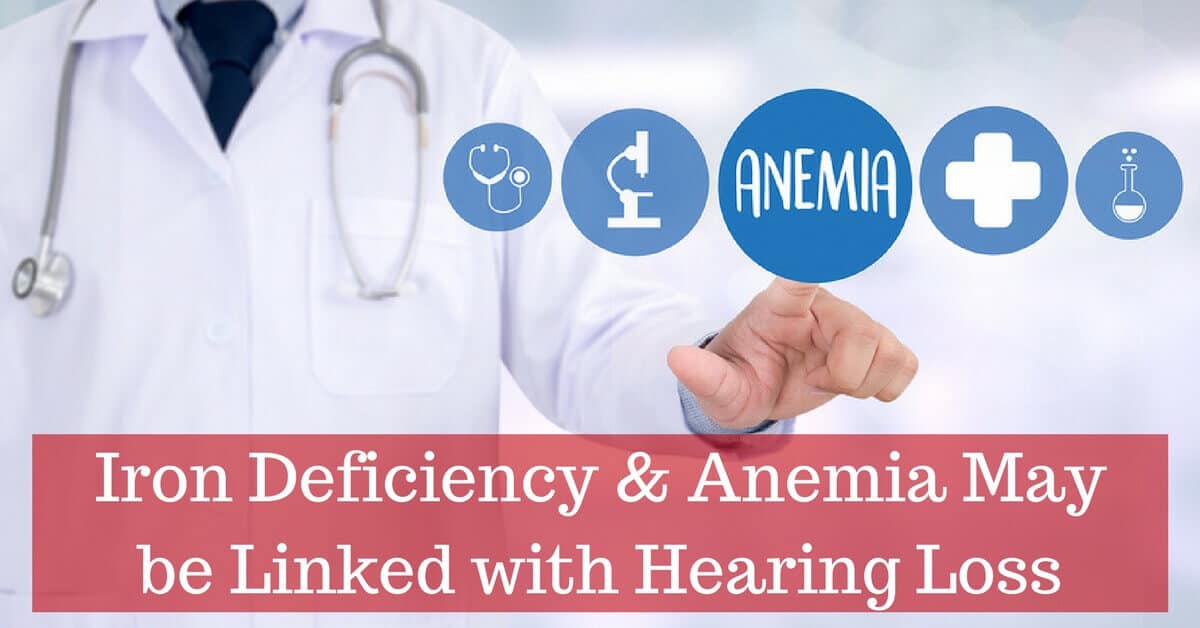
You might be familiar with the common causes of hearing loss, like noisy workplaces or crowded city streets. You’ve felt the ringing in your ears after a concert or sports event, and had trouble hearing normal sounds after an afternoon with earbuds in your ears. In fact, hearing loss affects 20% of Americans! But this is only part of the picture. There are several hidden causes of hearing loss, and diet, exercise, and medications all affect your hearing health. A new study even shows a link between iron deficiency anemia and hearing loss.
Why We Need Iron
Iron is very important for overall health. This mineral aids your red blood cells in carrying oxygen from the lungs throughout the body. Without enough oxygen in your body you’ll feel tired or weak, and lack energy. Iron levels fluctuate based on your activity levels and diet, but are also depleted through strenuous exercise and blood loss.
Iron is found in many common foods, so if you’re eating a balanced diet you’re probably getting enough iron. Foods that contain iron include meat, fish, beans, nuts and seeds, and dark greens like spinach or kale.
Iron Deficiency Anemia
Though iron is in many foods, and even in your daily vitamin supplements, some bodies have difficulty processing iron, and don’t have enough of it in their system. This results in iron deficiency anemia, or IDA. With IDA, your red blood cells aren’t able to carry enough oxygen through the body, and before long you’ll start to feel the negative effects of IDA such as fatigue, shortness of breath, dizziness, and even difficulty concentrating on simple tasks.
IDA and Hearing Loss
What does this have to do with hearing loss? Iron deficiency anemia was linked to hearing loss in a recent study. Collecting data from over 300,000 adults, they found that those with IDA were 50% more likely to have hearing loss! The study, run out of Pennsylvania State University College of Medicine, was published just a few months ago, in December 2016.
IDA was linked to sensorineural hearing loss, or SNHL. This is the most common form of hearing loss, with around 200,000 Americans diagnosed with SNHL every year. It’s caused by damage to the structures of the ear. The outer ear acts as an amplifier, directing sounds into your inner ear where the sound waves vibrate through the cochlea, or inner ear. There, the sound waves move tiny hair cells that translate sound waves into electrical signals to send to the brain. With SNHL, these hair cells have been damaged so your ears aren’t able to process sounds. They’re damaged or destroyed by exposure to loud noises, injuries, and even normal aging.
How is iron deficiency linked to hearing loss? With less iron in the body, and reduced oxygen in the blood, your ears are at risk. The hair cells of the inner ear depend on the blood to bring them fresh oxygen every second of the day. Without enough oxygen, these cells will die, and once they’re gone they don’t regenerate. This could lead to permanent hearing loss, as the ear doesn’t have enough healthy cells to perform its functions properly.
Taking Iron Supplements
If you’re always tired, lack energy, or experience shortness of breath, you may be iron deficient. It’s time to consult a doctor, review your medical history, and got for a blood test. If you have IDA, iron supplements are available which will replace the deficit in your iron levels, increase your energy, and safeguard your hearing.
Though iron supplements are available over the counter, we recommend consulting your doctor before taking supplements. Having too much iron in your body is just as dangerous as not having enough, so only take iron supplements if you’re sure you have IDA.
Do You Have Hearing Loss?
If you have hearing loss, whatever the cause, come visit us for a hearing test. While iron deficiency is linked to hearing loss, taking iron supplements won’t magically bring back your hearing. Once the damage has been done there’s no way to repair the cells in the inner ear, so it’s time to think about treatment methods. Hearing aids can restore all those sounds you’ve been missing, so you can get back to the more important things in life.
For more information on hearing health, contact us at one of our My Hearing Centers locations today.
